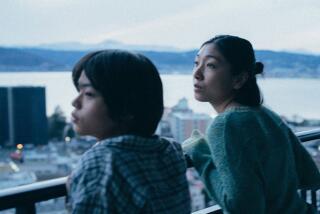MOVIE REVIEW : GANGSTER EPIC IN ‘ONIMASA’
- Share via
Hideo Gosha’s “Onimasa” (opening Friday at the Nuart for one week only) is a great gangster epic, possessing tragic dimension as well as scope and passion.
It illuminates its special world as richly and captivatingly as “The Godfather” and “Once Upon a Time in America” did theirs. Alternately raucous and elegiac, outrageously cruel and comical, “Onimasa” is an exceptionally robust and satisfying experience.
Tatsuya Nakadai, soon to be seen as Kurosawa’s King Lear in “Ran,” has the title role as the boss of a Japanese seaport city, ruling over its fish market, harbor facilities, gambling dens and brothels. His Onimasa is no ordinary thug, and that’s finally his downfall. Although illiterate, he dreams of being a great man and therefore becomes as guilty of the sin of hubris as a ruler in Greek tragedy. The achievement of his dream of greatness also spells his destruction.
There’s something always faintly comical about this yakuza, because he combines the traditional kimono with hats (ranging from Panamas to porkpies) that could have come from Capone’s closet. He has a Louis XIV’s grandiose love of ceremony and ritual, yet never hesitates to knock heads. The earthy, brutal realities of his world are forever puncturing his pretensions to grandeur.
But as the film progresses, Onimasa acquires stature and even dignity to go with his deep-voiced, larger-than-life Attila the Hun presence, and as he does, Nakadai’s gestures become more and more eloquent. But then this is a film of gesture and nuance, ever inviting us to sense its timelessness, its eternal truths beyond its wealth of incidents.
You can well imagine how overwhelming Onimasa seems to Matsue (Noriko Sendo), an adolescent girl whose parents are giving her to him as the price for setting them up with a shop. The couple have many children, but there’s an intelligence and self-possession about Matsue that makes him insist upon her.
Spanning 1918 to 1940, “Onimasa” charts its hero’s rise and fall along with its heroine’s coming of age. Onimasa is absolute master of his wife (Shima Awashita), whose impassive countenance and hard tone masks untold pain and loneliness. Under his roof live also a pair of concubines and more than a dozen retainers, as loyal as samurai, and at last a natural daughter (by yet another mistress), who grows up as fragile and ill-fated as Ophelia (played by the delicate, Geraldine Chaplin-like Kaori Takasugi, a real heartbreaker). In an environment in which women have no role but to serve men, Matsue, who possesses the resolve of her adoptive father, dares to hold out for an education. The gangster’s adopted daughter actually grows up to be a schoolteacher.
The turning point for both father and now-grown daughter (now played by exquisite Masako Natsume) is a 1934 railway strike which Onimasa is hired to break up. But a strike committeeman (Kei Yomomato) asks Onimasa how he can consider himself a great man if he sides against the workers. And when the subsequently imprisoned Yomomato receives visits (and a volume of Rilke poems) from Matsue, they soon fall in love.
Superbly structured by writer Koji Takada, “Onimasa” proceeds surely from one vivid incident to another. An undeniably symbolic dog fight (which also makes for Onimasa an underworld enemy who will seek vengeance two decades later), the tumultuous railway strike and a concluding classic samurai duel (in 1938 yet!) frame what is essentially a domestic drama in which reconciliation accompanies tragedy.
That duel is typical of the film’s use of anachronism, reminding us how Onimasa’s world is a world apart. For example, he and his rival drive to their ancient, deadly ritual of honor in trucks!
Photographed by Fujio Morita, “Onimasa” is a color film in which black, whites and grays predominate, punctuated by the scarlet of a kimono--or of a spurt of blood. Its images are as strikingly composed as Misuaki Kanno’s highly contemporary score, which effectively enriches key dramatic moments. Gosha has a glorious sense of the visual, equaled by his skill with actors, who at times move in such a stylized way as to seem choreographed. “Onimasa” is a film of many elements and considerable complexity, yet always of a piece.
For 25 years Nakadai has been the widest-ranging of Japan’s star actors, and “Onimasa” provides him with one of his most challenging, most comprehensive roles. Proud, foolish, vain, callous, brutal, arbitrary, courageous, yet capable at last of a genuine understanding of others (and also of perceiving the humor in a situation), Nakadai’s Onimasa is a pleasure to watch, never more so than when he’s trying to comprehend the puzzling ways of women.
Throughout, Gosha cuts to Awashita, relying upon her expressive skills to convey not only her true feelings beneath her rigid facade but also to serve as a kind of running commentary. Both Sendo and Natsume are lovely as Matsue, the adolescent and then the woman. Bold, beautiful and dynamic, “Onimasa” (Times-rated Mature for some sex, some violence and adult situations and themes) is uniquely Japanese in its ability to wrest a full measure of meaning from life’s vicissitudes.
More to Read
Only good movies
Get the Indie Focus newsletter, Mark Olsen's weekly guide to the world of cinema.
You may occasionally receive promotional content from the Los Angeles Times.









